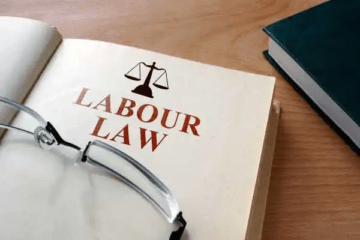
“The trade union is the most potent force in human history for uniting people of different races, creeds, colours, and nationalities.”
– Martin Luther King Jr.
INTRODUCTION
The Trade Union Act, 1926 provides for the registration, regulation, and protection of trade unions in India. Section 21A of the Act lists the disqualifications of office-bearers of trade unions. This provision aims to maintain the integrity and accountability of trade unions by disqualifying those who engage in activities that are detrimental to the interests of the union or its members. Office-bearers play a critical role in the functioning of a trade union. They are responsible for managing the day-to-day affairs of the union, representing the interests of union members, negotiating with employers on behalf of the members, and ensuring that the union operates in compliance with the law.
At the same time, it is important to ensure that office-bearers are held accountable for their actions and that they do not misuse their position for personal gain or to further their own interests. This is where disqualification of office-bearers under Section 21A of the Trade Union Act comes into play.
Section 21A of the Trade Union Act provides for the disqualification of an office-bearer of a registered trade union if they have been convicted of any offense involving moral turpitude and sentenced to imprisonment for not less than six months. This provision aims to ensure that individuals with a criminal record or a history of immoral conduct do not hold positions of power in a trade union.
The disqualification of office-bearers is necessary to maintain the integrity and credibility of the trade union movement. It helps to prevent abuse of power, corruption, and other forms of malpractice that can harm the interests of union members and undermine the union’s ability to effectively represent its members. Overall, the need for office-bearers in a trade union is vital, but it is equally important to ensure that they are held accountable and disqualified if they engage in any activities that are detrimental to the interests of the union and its members.
BACKGROUND
The Trade Union Act, 1926 is an Indian legislation that provides for the registration and regulation of trade unions. The Act was passed by the Indian legislature in March 1926 and was later amended in 2001. The main objective of the Act is to provide legal recognition and protection to registered trade unions in India. The Act defines a trade union as any combination of workers or employers that is formed primarily for the purpose of regulating the relations between workers and employers or between employers and workers.
Prior to the enactment of the Trade Union Act, trade unions were not recognized as legal entities in India. This meant that they had no legal protection and could not enter into legally binding agreements with employers. The Act changed this by providing for the registration of trade unions and granting them legal status. This enabled trade unions to engage in collective bargaining with employers and to negotiate better wages, working conditions, and other benefits for their members.
Over the years, the Trade Union Act has been amended several times to reflect changing social and economic conditions. The most recent amendment to the Act was made in 2001, which introduced several new provisions to strengthen the rights of trade unions and their members. Today, the Trade Union Act remains an important piece of legislation that protects the rights of workers and promotes collective bargaining in India.
DISQUALIFICATIONS OF OFFICE-BEARERS
Section 21A of the Trade Union Act, 1926 provides for the disqualification of office bearers of a trade union in certain circumstances.[1] In order to be appointed as office holders or members of the executive of a registered trade union, a person must meet both of the following requirements:
- He must be at least 18 years old; and
- He must not have been convicted of a crime involving moral turpitude and sentenced to prison, unless five years have passed since their release.[2]
The implementation of the aforementioned clause is retroactive according to Section 21A(2). It states that any member of the executive or other office-holder of a registered trade union who, prior to the implementation of the (Indian) Trade Unions (Amendment) Act, 1964, was convicted of any offence involving moral turpitude and sentenced to imprisonment shall cease to be a member or office-bearer on the date of such commencement, unless a period of five years has elapsed since his release prior to that date.[3]
Some of the important case laws related to disqualification of office bearers under Section 21A are:
- Hind Mazdoor Sabha vs. Sugar Mill Case (1979): In this case, the Supreme Court held that the disqualification of an office bearer of a trade union under Section 21A should be based on the existence of a direct interest in the establishment with which the trade union is connected.[4]
- Indian National Trade Union Congress vs. National Union of Commercial Employees Case (1980): In this case, the Supreme Court held that if an office bearer of a trade union becomes a member of the board of directors of a company, then such office bearer would be disqualified under Section 21A.[5]
- Steel Authority of India Ltd. vs. National Union of Waterfront Workers (2001): In this case, the Supreme Court held that an office bearer of a trade union who is also an employee of the establishment cannot be disqualified under Section 21A, as long as he/she does not have any direct interest in the management of the establishment.[6]
- All India Trade Union Congress vs. National Thermal Power Corporation (2002): In this case, the Supreme Court held that an office bearer of a trade union who is also a shareholder in the establishment with which the trade union is connected, would be disqualified under Section 21A.[7]
These case laws provide guidance on the interpretation and application of Section 21A of the Trade Union Act, and highlight the importance of avoiding conflicts of interest between the office bearers of a trade union and the establishment with which it is connected.
RIGHTS AND DUTIES OF OFFICE BEARERS AND MEMBERS
The following items may be inspected by an office-holder or member at any time that may be specified in the trade union’s rules: (i)the account-books; and (ii) the list of members[8]. A member who is over the age of 15 has the authority to execute all documents and provide any acquittance required by law.[9] In Secretary of Tamil Nadu Electricity Board Accounting Subordinate Union v. Tamil Nadu Electricity Board[10], the boundaries of the legal rights and privileges were established. Two employees of the Tamil Nadu Electricity Board were given permission to perform the full-time union work in this instance. After nearly 4 years, the board, however, declined to prolong this facility. The administration referred a disagreement to the labour court for resolution after it was raised. The labour court ruled that this was only a favour given to the union’s officers and not a condition of employment. Aggrieved by this order, the trade unions preferred a writ petition before the Madras High Court. The trade unions questioned whether a workman had a legal right to engage in trade union activity without attending to office duties, whether the withdrawal of permission to engage in full-time trade union work would affect service conditions, and whether trade union activity was a privilege within the meaning of Item 8 of Schedule IV of the Act. The court answered all three issues in the negative, stating that trade unionism was not a right that could be claimed during office hours and that allowing it would be an anachronism and would amount to fleecing taxpayers. The court emphasised that trade unionism was recognized all over the world, but it did not mean that office-bearers or trade unions could claim a right to engage in trade union activities during office hours. The court believed that this would go against the purpose for which the workman was appointed by the Electricity Board and that taxpayers paid money not to encourage trade unionism but to ensure that people entrusted with the task of doing service would do their service. The court welcomed trade unionism as it brings about solidarity among workers but emphasised that a right to active trade unionism during office hours could not be claimed.
Also, in the case of Usha Breco Mazdoor Sangh v. M/s Usha Breco Ltd[11], the court held that while the management cannot use victimization or unfair labor practices to remove union leaders, the union leaders must also maintain discipline. The court also emphasized that a union leader does not have immunity from being held accountable for misconduct and that assault and intimidation are criminal offenses. The court recognized the importance of a healthy trade union but cautioned that it should not come at the expense of taxpayers. This approach would promote discipline in the industry.
The Court, in the case of Burn & Co. v. Their Workmen[12], held that office-bearers are not exempt from punishment for being absent from their duties, and this includes office-bearers of a trade union who are also subject to disciplinary action[13]. Additionally, the Court stated that office-bearers of a trade union cannot claim immunity from being transferred.[14]
Here are a few case laws related to the rights and duties of office bearers under the Trade Union Act:
- Indian National Trade Union Congress vs. Hindustan Lever Ltd. & Ors. (1995): This case dealt with the question of whether an office bearer of a trade union can be transferred by the employer without the consent of the union. The Supreme Court held that such transfers are illegal and amount to unfair labour practices.[15]
- Hindustan Antibiotics Mazdoor Sangh vs. Hindustan Antibiotics Ltd. (1996): In this case, the issue was whether office bearers of a trade union can be transferred to another unit of the employer. The court held that the employer has the right to transfer employees, including office bearers of the union, but it should not be done with a mala fide intention to victimize or harass them.[16]
- A.K. Roy vs. Voltas Ltd. & Anr. (1997): This case dealt with the issue of whether an office bearer of a trade union can be dismissed without an inquiry. The Supreme Court held that an inquiry is mandatory before dismissing an office bearer of a union, and that the principles of natural justice must be followed.[17]
- All India Bank Employees’ Association vs. National Industrial Tribunal (1961): This case dealt with the question of whether an office bearer of a trade union can be removed by the union itself. The court held that the power to remove office bearers of a union is vested in the union itself, and that the court cannot interfere in such matters unless there is evidence of mala fides or violation of the principles of natural justice.[18]
- Bhagwati Prasad Dixit vs. Union of India (1976): In this case, the issue was whether an office bearer of a trade union can be suspended pending an inquiry. The Supreme Court held that a union office bearer can be suspended pending an inquiry, but the suspension should not be for an indefinite period and should not amount to victimization or harassment. The principles of natural justice must also be followed during the inquiry.[19]
As The Trade Union Act, 1926 governs the functioning of trade unions in India, it lays down certain rights and duties of office bearers in trade unions, as follows:
- Right to represent workers: The office bearers of a trade union have the right to represent the workers in collective bargaining with the employers.
- Duty to act in good faith: The office bearers of a trade union have a duty to act in good faith and in the best interests of the workers they represent. They must not act in a way that is against the interests of the workers or that is detrimental to the trade union.
- Right to collect subscription: The office bearers of a trade union have the right to collect subscription fees from its members. This is necessary for the functioning of the trade union.
- Duty to maintain proper accounts: The office bearers of a trade union have a duty to maintain proper accounts of the union’s income and expenditure. They must keep accurate records of all financial transactions.
- Right to call meetings: The office bearers of a trade union have the right to call meetings of the members of the union. They can also fix the agenda for the meeting.
- Duty to follow the constitution: The office bearers of a trade union have a duty to follow the constitution of the union. They must ensure that the activities of the union are in line with the provisions of the constitution.
- Right to make rules: The office bearers of a trade union have the right to make rules and regulations for the functioning of the union, as long as these rules do not violate the provisions of the Trade Union Act.
- Duty to promote the welfare of workers: The office bearers of a trade union have a duty to promote the welfare of the workers they represent. They must strive to improve the working conditions and rights of the workers.
In summary, the Trade Union Act provides certain rights and duties to office bearers in trade unions. These rights and duties are aimed at ensuring the proper functioning of the union and the protection of the interests of its members.
CONCLUSION
The disqualification of office-bearers under Section 21A of the Trade Union Act, 1926 is a crucial provision for maintaining the integrity and credibility of trade unions in India. Office-bearers play a critical role in representing the interests of union members, negotiating with employers, and managing the day-to-day affairs of the union. However, it is equally important to ensure that office-bearers are held accountable for their actions and that they do not engage in any activities that are detrimental to the interests of the union and its members.
Section 21A of the Trade Union Act provides for the disqualification of office-bearers who have been convicted of any offense involving moral turpitude and sentenced to imprisonment for not less than six months. This provision helps to prevent abuse of power, corruption, and other forms of malpractice that can harm the interests of union members and undermine the union’s ability to effectively represent its members.
Over the years, the Trade Union Act has been amended several times to reflect changing social and economic conditions. The most recent amendment to the Act was made in 2001, which introduced several new provisions to strengthen the rights of trade unions and their members. Today, the Trade Union Act remains an important piece of legislation that protects the rights of workers and promotes collective bargaining in India.
In conclusion, the disqualification of office-bearers under Section 21A is necessary to maintain the integrity and credibility of the trade union movement in India. It is important to ensure that office-bearers are held accountable and disqualified if they engage in any activities that are detrimental to the interests of the union and its members. This will help to promote transparency, accountability, and good governance within trade unions, and strengthen their ability to represent the interests of workers in India.
[1] Section 21A, The Trade Unions Act, 1926.
[2] Section 21A(1), The Trade Unions Act, 1926.
[3] Section 21A(2), The Trade Unions Act, 1926.
[4] Hind Mazdoor Sabha vs. Sugar Mill, 1975 AIR 1735.
[5] Indian National Trade Union Congress vs. National Union of Commercial Employees, 1962 AIR 1080, 1962 SCR Supl. (3) 157.
[6] Steel Authority of India Ltd. vs. National Union of Waterfront Workers, AIR 2001 SC 3527, (2001) 7 SCC 1.
[7] All India Trade Union Congress vs. National Thermal Power Corporation, (2002) 5 SCC 203, AIR 2002 SC 1895.
[8] Section 20, The Trade Union Act, 1926.
[9] Section 21, The Trade Union Act, 1926.
[10] Secretary of Tamil Nadu Electricity Board Accounting Subordinate Union v. Tamil Nadu Electricity Board, (1984) 2 LLJ 478.
[11] Usha Breco Mazdoor Sangh v. M/s Usha Breco Ltd, 2008 LLR 619.
[12] Burn & Co. v. Their Workmen, (1959) I LLJ 458.
[13] (1991) LLR 456
[14] TNEB Engineers Sangam v. Tamil Nadu Electricity Board, (1996) LLR 942 (Mad).
[15] Indian National Trade Union Congress vs. Hindustan Lever Ltd. & Ors., 1996 AIR 285.
[16] Hindustan Antibiotics Mazdoor Sangh vs. Hindustan Antibiotics Ltd., 1967 AIR 948, 1967 SCR (1) 652.
[17] A.K. Roy vs. Voltas Ltd. & Anr., 1973 AIR 225, 1973 SCR (2)1089.
[18] All India Bank Employees’ Association vs. National Industrial Tribunal, 1962 AIR 171, 1962 SCR (3) 269.
[19] Bhagwati Prasad Dixit vs. Union of India, 1986 AIR 1534, 1986 SCR (2) 823.
Written by: Zeerak Jabeen, Department of Law, School of Legal Studies, Central University of Kashmir.




0 Comments